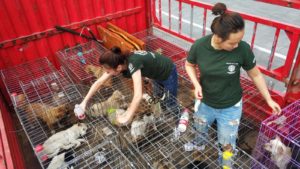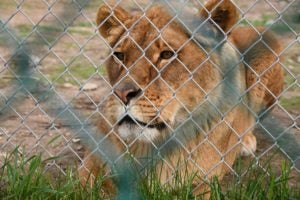
BUCHAREST/BRUSSELS—Humane Society International/Europe is celebrating a monumental victory for animal protection in Romania today, as the Romanian Parliament has voted overwhelmingly to ban chinchilla and mink fur farming, the only two fur farm industries that exist in the country. This groundbreaking decision is the result of nearly two years of political debates and sustained campaigning by HSI/Europe’s Romania office and fellow animal groups. Romania now becomes the 22nd country in Europe and 16th EU Member State to ban fur farming, marking a significant milestone in HSI’s global campaign to end the cruel practice of breeding and killing animals for fur fashion.
Ruud Tombrock, executive director for HSI/Europe, said: “Today’s decision to ban fur farming is not only a landmark moment for animal protection in Romania, but also a pivotal step in the broader European effort to end one of the cruelest forms of exploitation of animals. As public concern for animal welfare grows across Europe, demonstrated by the overwhelming success of the Fur Free Europe ECI, it is clear that fur farming has no place in a compassionate and ethical society and the only way to move forward is by adopting an EU-wide ban on production of fur.”
The bill was originally proposed after HSI/Europe conducted a shocking undercover investigation exposing appalling conditions on fur farms in Romania. Chinchillas were filmed confined in small, filthy wire cages, only to be killed for fur fashion at just a few months old in improvised gas chambers or by having their necks broken. Now that the bill has been voted through in the Chamber of Deputies, once promulgated it will make fur farming illegal in Romania effective 1st of January 2027. Although the legislation must be promulgated by President Klaus Iohannis and published in the Official Journal to become effective, this is anticipated to pass without delay.
According to a nationwide survey commissioned by HSI/Europe, over 67% of Romanians support a fur farming ban, further emphasizing public sentiment against the fur industry. In addition, HSI/Europe’s campaign in Romania gathered more than 74,000 petition signatures in favor of ending fur farming, which HSI/Europe submitted to the Romanian Parliament.
The fur industry in Romania is in decline, with the number of fur farms having dropped dramatically from more than 150 in 2013 to around a dozen in 2022 including two large mink farms producing approximately 100,000 mink pelts and 15,000 chinchilla pelts annually. The ban in Romania also tackles the environmental and human health hazards linked to fur farming, including the spread of zoonotic diseases, positioning Romania within the broader European movement that emphasizes animal welfare and sustainable practices.
Fur facts:
- Tens of millions of animals suffer and die each year in the global fur trade, the majority reared in barren battery cages on fur farms.
- Fur farming has now been banned in 22 European countries—the 16 Member States of Austria, Belgium, Croatia, Czech Republic, Estonia, France, Ireland, Italy, Latvia, Lithuania, Luxembourg, Malta, Netherlands, Romania, Slovakia, Slovenia plus Bosnia and Herzegovina, Guernsey, Norway, United Kingdom, North Macedonia and Serbia. In addition, Switzerland and Germany have implemented strict regulations which have effectively ended fur farming and Denmark, Sweden and Hungary have imposed measures that have ended the farming of certain species. Political discussion of a ban is underway in Bulgaria and Sweden.
- Mink on almost 500 fur farms across 13 countries in Europe and North America have been found to be infected with COVID-19, and Highly Pathogenic Avian Influenza A(H5N1) has been found on 72 fur farms (one in Spain, 71 in Finland) to date. Millions of mink, arctic fox, red fox, raccoon dogs and sable have been slaughtered on public health grounds.
- Ten fashion brands in Romania have pledged to go fur-free after working with Humane Society International/Europe, and have become the first designers in Romania to join the global Fur Free Retailer Ioana Ciolacu, Muse um Concept, REDU, OCTAVIA CHIRU, Katerini, Hooldra, Feeric Fashion Week, Scapadona, Axente and Lenca join the almost 1,600 fashion brands, retailers and designers in 25 countries around the world that are part of the Fur Free Retailer program, including Gucci, Moncler, Prada, Adidas, H&M and Zara.
ENDS
View images/video are available here. To download these visuals, please contact commsromania@hsi.org
Media contact: Yavor Gechev: +359889468098; ygechev@hsi.org





